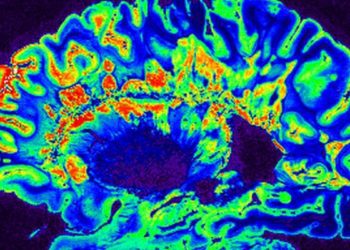Glatiramer acetate (Copaxone) therapy may alter B cell function in multiple sclerosis
1. Glatiramer acetate is an immunomodulatory drug used in the treatment of multiple sclerosis.
2. Glatiramer acetate appears to alter the production of cytokines and growth factors by B cells in vitro.
Evidence Rating Level: 3 (Average)
Study Rundown: It is hypothesized that B cell dysfunction is involved in the pathogenesis of multiple sclerosis (MS). Specifically, studies have suggested that B cells are not able to produce appropriate levels of various inflammatory cytokines and growth factors. A peptide with immunomodulatory properties, glatiramer acetate, is composed of amino acids similar to the autoantigen implicated in MS to myelin basic protein and is used to treat MS. It is thought to potentially reduce the progression of disease and accruement of disability.
The authors of this paper hypothesized that the B cells of patients who received glatiramer acetate would be functionally different from those who did not. They exposed B cells from both groups to stimulatory conditions and observed them in culture for five days. B cells after treatment were observed to produce increased titers of interleukin-10 and decreased titers of interleukin-6. Further, there was a global reduction of memory B cell subsets, but a paradoxical increase in IgM and IgG production. However, it is not clear whether these changes contribute to the therapeutic effects of this drug. This study should eventually be corroborated by in vivo work, as well as with longitudinal studies that cover more than a several day period.
Click to read the study, published today in JAMA Neurology
Relevant Reading: Glatiramer acetate: mechanisms of action in multiple sclerosis
In-Depth [case-control study]: The University of Texas Medical Center recruited patients with MS, and peripheral blood samples were obtained from these patients. ELISA was used to evaluate the presence and level of interleukins and other B cell products. Cell samples were obtained from 15 healthy donors. 22 patients with MS receiving glatiramer acetate therapy were compared with 22 patients with MS that had not received disease-modifying therapy in the 3 months prior to the study.
CD19+ B cells from treatment-naïve patients made lower levels of interleukin-10 under all conditions tested (including several stimulatory conditions known to activate B cells) when compared with the B cells of both healthy controls and patients that had received glatiramer acetate. B cells from patients receiving glatiramer acetate showed similar proliferation under exposure to high or low levels of CD40L, whereas treatment-naïve and healthy donor B cells had significantly higher proliferation under high-dose CD40L exposure. Additionally, the B cells from treatment-naïve patients produced 19 times the amount of LT-alpha than healthy controls and 16.2 times that of treatment subjects.
More from this author: Dementia patients frequently on medications with minimal benefit, Walk test linked to quality of life in multiple sclerosis, Deep brain stimulation may be safe for older Parkinson patients, Exome sequencing potentially valuable in diagnosing familial cerebellar ataxias, Functional connectivity similar between autosomal dominant and late onset Alzheimer Disease
Image: PD
©2012-2014 2minutemedicine.com. All rights reserved. No works may be reproduced without expressed written consent from 2minutemedicine.com. Disclaimer: We present factual information directly from peer reviewed medical journals. No post should be construed as medical advice and is not intended as such by the authors, editors, staff or by 2minutemedicine.com. PLEASE SEE A HEALTHCARE PROVIDER IN YOUR AREA IF YOU SEEK MEDICAL ADVICE OF ANY SORT.







